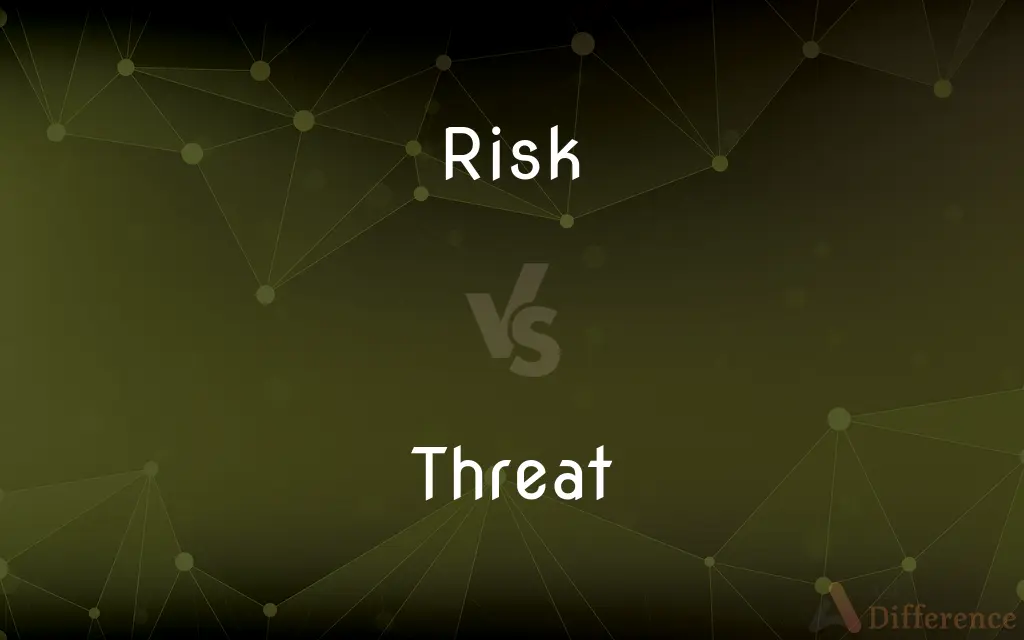Risk vs. Threat — What's the Difference?
By Tayyaba Rehman & Urooj Arif — Updated on March 18, 2024
Risk involves the potential for loss or damage when a threat is realized, focusing on consequences and likelihood, whereas a threat is a potential cause of an unwanted incident, highlighting the source of danger.

Difference Between Risk and Threat
Table of Contents
ADVERTISEMENT
Key Differences
Risk is defined by the combination of the likelihood of an event and its consequences, indicating the potential for harm or loss in the face of uncertainty. Whereas a threat specifically refers to a potential cause of an unwanted incident, often emphasizing the external or internal source of danger that could exploit vulnerabilities.
While risk assessment involves evaluating the probability and impact of risks, identifying measures to mitigate or manage them, threats are identified during a threat assessment, focusing on understanding the nature, source, and capability of the threat to cause harm.
Risk management is a broader process that includes the identification, analysis, and response to risk factors, integrating the concept of threat as one of the elements to be assessed and mitigated. On the other hand, threat management is more focused on the identification, assessment, and response to threats, specifically aiming to reduce or neutralize potential dangers.
In the context of information security, risk might encompass a range of potential negative outcomes, such as data breaches, system failures, or compliance issues, driven by various threats like malware, hackers, or natural disasters. Whereas threats in the same context would be the specific agents or events like cyber-attacks or equipment failures that could lead to these negative outcomes.
Risk is inherently tied to decision-making, as individuals and organizations must weigh the potential negative outcomes against the benefits of certain actions or inactions. Conversely, identifying and understanding threats is crucial for proactive security measures and planning, aiming to prevent or minimize the impact of those threats before they can manifest into actual risks.
ADVERTISEMENT
Comparison Chart
Definition
Potential for loss or damage when a threat is realized.
A potential cause of an unwanted incident, posing danger.
Focus
Consequences and likelihood.
Source of danger and capability to cause harm.
Assessment
Evaluates probability and impact, aiming to mitigate.
Identifies nature, source, and capability, aiming to understand.
Management
Broader process including identification, analysis, and response.
Focuses on reducing or neutralizing potential dangers.
Context Example
In cybersecurity, risks include data breaches due to various threats.
In cybersecurity, threats include malware or hacker attacks.
Compare with Definitions
Risk
The possibility of loss or injury.
Investing in stocks carries a certain level of risk.
Threat
A person who inspires fear or dread;
He was the terror of the neighborhood
Risk
The potential for realizing unwanted, negative consequences of an action.
There's a significant risk of data loss if backups aren't maintained.
Threat
An indication of impending danger or harm.
The rising river levels posed a threat to the coastal community.
Risk
The exposure to the chance of injury or loss; a hazard or dangerous chance.
It's a risk to travel during extreme weather conditions.
Threat
A declaration of an intention to inflict harm.
The bomb threat caused an evacuation of the building.
Risk
A factor, thing, element, or course involving uncertain danger.
Smoking is a health risk.
Threat
The possibility of trouble, danger, or ruin.
The threat of bankruptcy loomed over the small business.
Risk
The degree of probability of such loss.
The risk of heart disease increases with age.
Threat
A person or thing likely to cause damage or danger.
Hackers are a significant threat to internet security.
Risk
In simple terms, risk is the possibility of something bad happening. Risk involves uncertainty about the effects/implications of an activity with respect to something that humans value (such as health, well-being, wealth, property or the environment), often focusing on negative, undesirable consequences.
Threat
An expression of an intention to inflict pain, harm, or punishment.
Risk
The possibility of suffering harm or loss; danger.
Threat
An indication of impending danger or harm
A threat of frost in the air.
Risk
A factor, thing, element, or course involving uncertain danger; a hazard
"the usual risks of the desert.
Threat
One that is regarded as a possible source of harm or danger
Viewed the stranger as a threat to the community.
Risk
The danger or probability of loss to an insurer.
Threat
The condition of being in danger or at risk
Under threat of attack.
Risk
The amount that an insurance company stands to lose.
Threat
To threaten.
Risk
The variability of returns from an investment.
Threat
An expression of intent to injure or punish another.
Risk
The chance of nonpayment of a debt.
Threat
An indication of potential or imminent danger.
Risk
One considered with respect to the possibility of loss
A poor risk.
Threat
A person or object that is regarded as a danger; a menace.
Risk
To expose to a chance of loss or damage; hazard.
Threat
(transitive) To press; urge; compel.
Risk
To incur the risk of
His action risked a sharp reprisal.
Threat
To threaten.
Risk
(uncountable) The probability of a negative outcome to a decision or event.
There is risk of being brutalized, arrested, imprisoned and tortured, all because I want you to know the truth about this matter.
Threat
(intransitive) To use threats; act or speak menacingly; threaten.
Risk
(uncountable) The magnitude of possible loss consequent to a decision or event.
Threat
The expression of an intention to inflict evil or injury on another; the declaration of an evil, loss, or pain to come; menace; threatening; denunciation.
There is no terror, Cassius, in your threats.
Risk
The potential negative effect of an event, determined by multiplying the likelihood of the event occurring with its magnitude should it occur.
Threat
To threaten.
Of all his threating reck not a mite.
Our dreaded admiral from far they threat.
Risk
(countable) A possible adverse event or outcome.
Threat
Something that is a source of danger;
Earthquakes are a constant threat in Japan
Risk
(insurance) A type of adverse event covered under an insurance policy.
Threat
A warning that something unpleasant is imminent;
They were under threat of arrest
Risk
(countable) A thing (from the perspective of how likely or unlikely it is to cause an adverse effect).
That man is going to be a big risk once he's out of prison.
Those stairs are a major risk.
Risk
A borrower (such as a mortgage-holder or person with a credit card).
A good credit rating indicates the customer is a desirable risk.
Risk
(finance) A financial product (typically an investment).
Subprime mortgages are poor risks; especially for a pension scheme.
Risk
(insurance) An entity insured by an insurer.
Risk
(transitive) To incur risk of (something).
Risk
(transitive) To incur risk of harming or jeopardizing.
Risk
(transitive) To incur risk as a result of (doing something).
Risk
Hazard; danger; peril; exposure to loss, injury, or destruction.
The imminent and constant risk of assassination, a risk which has shaken very strong nerves.
Risk
Hazard of loss; liabillity to loss in property.
Risk
To expose to risk, hazard, or peril; to venture; as, to risk goods on board of a ship; to risk one's person in battle; to risk one's fame by a publication.
Risk
To incur the risk or danger of; as, to risk a battle.
Risk
A source of danger; a possibility of incurring loss or misfortune;
Drinking alcohol is a health hazard
Risk
A venture undertaken without regard to possible loss or injury;
He saw the rewards but not the risks of crime
There was a danger he would do the wrong thing
Risk
The probability of becoming infected given that exposure to an infectious agent has occurred
Risk
The probability of being exposed to an infectious agent
Risk
Expose to a chance of loss or damage;
We risked losing a lot of money in this venture
Why risk your life?
Risk
Take a risk in the hope of a favorable outcome;
When you buy these stocks you are gambling
Common Curiosities
What is threat management?
Threat management involves identifying, assessing, and responding to threats to reduce or neutralize potential dangers.
What is risk management?
Risk management is the process of identifying, analyzing, and responding to risk factors, aiming to mitigate potential negative outcomes.
What is the main difference between risk and threat?
Risk is about the potential for harm or loss when a threat is realized, focusing on consequences and likelihood, while a threat is a potential cause of an unwanted incident, highlighting the source of danger.
How is a threat identified?
A threat is identified through a threat assessment process, which examines the nature, source, and capability of potential dangers.
Is it possible to eliminate all risks and threats?
It's nearly impossible to eliminate all risks and threats, but effective management strategies can significantly reduce their likelihood and impact.
How do individual perceptions of risk and threat differ?
Individual perceptions can vary greatly based on personal experiences, knowledge, and tolerance for uncertainty and danger.
Can a threat exist without risk?
Yes, a threat can exist without risk if there are no vulnerabilities for the threat to exploit or if the potential impact is negligible.
How do risk and threat relate to each other?
A threat is a potential cause that can lead to a risk, which is the realization of harm or loss due to that threat.
How is risk assessed?
Risk is assessed by evaluating the probability and impact of potential negative outcomes, often involving a risk matrix or similar tool.
Can risks be positive?
While risk often refers to potential negative outcomes, in some contexts (like finance), it can also involve the potential for positive gains, albeit with uncertainty.
Why is understanding threats important?
Understanding threats is crucial for developing effective security measures and preventative strategies to protect against potential harm.
How do organizations manage risks and threats?
Organizations manage risks and threats through comprehensive strategies that include prevention, detection, response, and recovery measures.
What role do vulnerabilities play in the relationship between risk and threat?
Vulnerabilities are weaknesses that can be exploited by threats, thereby increasing the risk of negative outcomes.
What is the importance of communication in risk and threat management?
Effective communication is vital for raising awareness, ensuring understanding, and coordinating responses to risks and threats.
Can technological advancements reduce risks and threats?
Technological advancements can significantly reduce certain risks and threats, especially in areas like cybersecurity, but can also introduce new challenges.
Share Your Discovery

Previous Comparison
Final vs. Irrevocable
Next Comparison
Jews vs. IsraelitesAuthor Spotlight
Written by
Tayyaba RehmanTayyaba Rehman is a distinguished writer, currently serving as a primary contributor to askdifference.com. As a researcher in semantics and etymology, Tayyaba's passion for the complexity of languages and their distinctions has found a perfect home on the platform. Tayyaba delves into the intricacies of language, distinguishing between commonly confused words and phrases, thereby providing clarity for readers worldwide.
Co-written by
Urooj ArifUrooj is a skilled content writer at Ask Difference, known for her exceptional ability to simplify complex topics into engaging and informative content. With a passion for research and a flair for clear, concise writing, she consistently delivers articles that resonate with our diverse audience.
















































